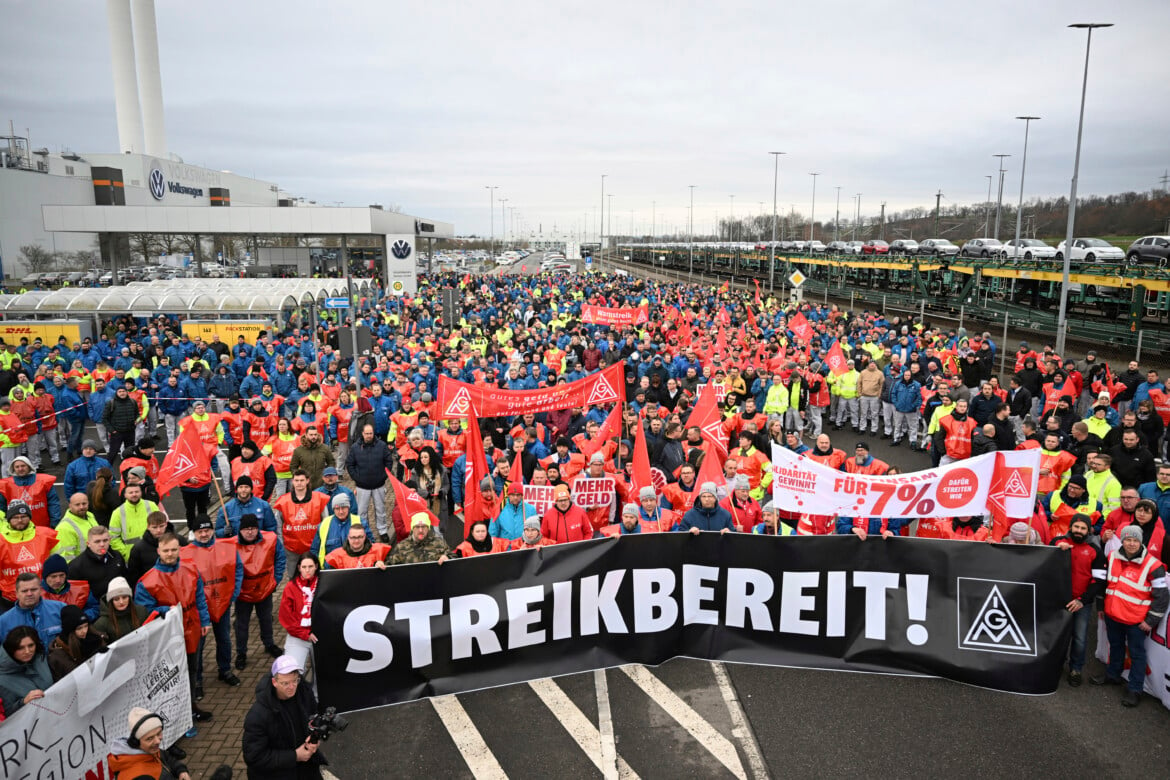Reportage
Volkswagen workers went on strike in Germany this week
“We want wages increased by 7 percent and €170 more per month in the paycheck of young trainees,” they insist, raising an issue that is truly inter-generational for them. “Major shareholders have received an amount in dividends that a worker would only make in 100,000 years of work.”

Work slowed to a crawl on Monday at Volkswagen's ten factories across Germany, with the assembly lines for the production of two million vehicles going at a snail's pace. “This result is only the beginning. If a warning strike doesn’t work, the next step will be a total plant shutdown for twenty-four hours,” warned the union delegate from Wolfsburg-based Ig Metall after stressing the extraordinary impact of the first day of the general protest by VW workers, triggered by Friday’s breakdown in the negotiations with the company's board of directors.
“Wages must not be touched. We are not willing to bow our heads in the face of the layoff plan announced by management, who have systematically rejected all our alternative proposals to save jobs. The union truce we have guaranteed so far is over. Now all we have left is a head-on clash,” confirmed the workers wearing blue overall and the red jackets of Ig Metall at the gates of the factories in Hesse, Lower Saxony, North Rhine-Westphalia, and also in East Germany, which the Group's managers promised would be uplifted by the electric car revolution.
in Zwickau, in the heart of Saxony, in front of the plant that until 1990 mass-produced the Trabant (the other “people's car,” that of the East Germans), the mixture of anger, fear, and sense of abandonment among the workers saddled with paying for the “bankrupt management by the managers” reached the breaking point. It was the same in Chemnitz, formerly called Karl Marx Stadt, where much of the WV Group's engines are now produced, and also in Dresden, the capital of Saxony, at the strategic center of VW's production of components. Here too, as in the rest of the country, workers on Monday alternated their work stoppages every few hours, resulting in production constantly stopping and starting, according to the usual practice of warning strikes.
With the only offer from Volkswagen’s top management being the one in the cost-slashing plan – a 10 percent cut in monthly salaries and the cancellation of the bonuses previously agreed to in the agreement signed with the works council – the East German VW workers' demands are not limited to stopping the layoffs: “We want wages increased by 7 percent and €170 more per month in the paycheck of young trainees,” they insist, raising an issue that is truly inter-generational for them.
“There are no projects for revitalization, but only for staff cuts,” the Zwickau workers accuse. Hence their slogan, “We're fed up,” chanted in front of the factory gates: “4,500 workers took part,” Ig Metall announced after starting the “stop and go” strike at 9:30 a.m. At the same time, 500 of their colleagues from Chemnitz marched with protest signs, followed in the afternoon by employees at the Dresden factory. They feel abandoned by company managers, but also by leading government officials, who are wary of being seen at Ig Metall picket lines when we are three months away from a vote that will likely kick them out of office.
“Since 2014 alone, the major shareholders have received an amount in dividends that a worker would only make in 100,000 years of work” – Daniela Cavallo, works council president
Among the top politicians running away from the VW industrial crisis is, Chancellor Olaf Scholz certainly stands out, after he went on a “surprise” visit to Kyiv to announce the sending of “a new 650 million euro aid package to Ukraine.” An announcement that was completely at odds with reality: not only is he going to lose a confidence vote in the Bundestag in the next two weeks, but there is no “new” allocation of funds at all – no further financial aid to Kyiv has been approved. This is confirmed by official documents and by those in Berlin who were in charge of writing the Scholz government's budget, who clarified that the only possibility was that Scholz was promising “previously allocated funds in the process of being delivered.”
This campaign photo op by the incumbent SPD candidate was probably intended to dodge the accusations coming from the EU regarding his firm refusal to send Taurus missiles to Kyiv. It certainly won’t do anything to convince Germans that funding Ukraine’s defense is a higher priority than the Volkswagen crisis.
It seems that, officially, public money for supporting the war in Ukraine can always be found in Berlin, beyond mere accounting artifices, while no funds can ever be found to support the European automotive giant, one-fifth owned by the state of Lower Saxony, which is preparing to lay off up to 150,000 workers in the medium term, no longer needed for production.
In any case, the time of dumping the industrial crisis on poor areas of the country – which mostly brought East Germany to its knees – is now over. With 15,500 employees, Baunatal, near Kassel, is the largest plant in the VW supply chain. Much of the electric car drivetrain is assembled here, in the heart of West-Germany. And there is no more doubt that it is a political issue.
Originally published at https://ilmanifesto.it/germania-avviso-a-volkswagen-gli-operai-si-fermano on 2024-12-03
